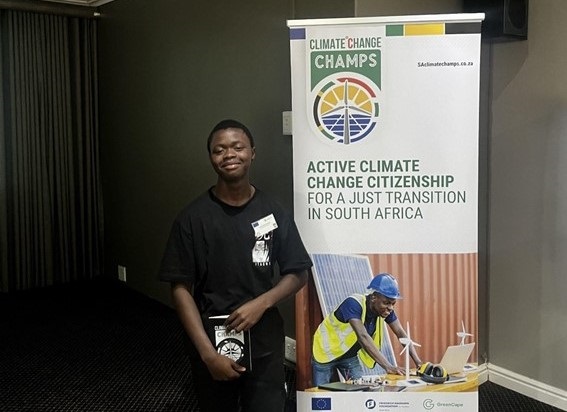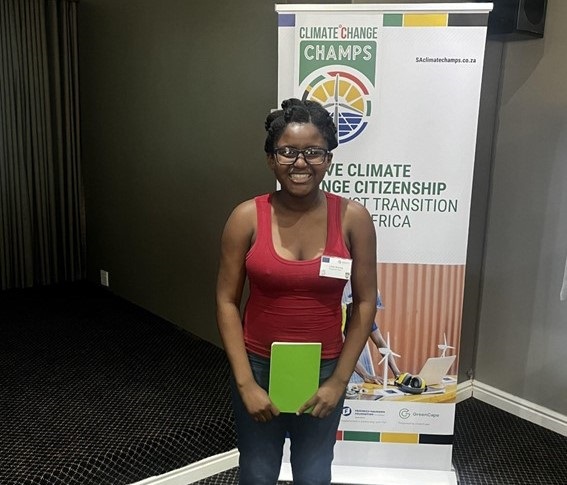
The SA Climate Change Champs hosted a Presentation and Design workshop for youth in climate club host schools in the Eastern Cape during October 2023. This workshop set out to promote solution-based thinking in addressing climate change and renewable energy opportunities.
This follows from the Winter Media workshops that were held earlier in July 2023, which equipped the youth with media and journalistic tools to enable them to exercise their voice on media platforms on the topics of climate change mitigation adaptation, and renewable energy.
The Just Energy Transition Plan (JETP) was a key topic that was explored during the workshops, where these climate champions engaged the topic in an array of exercises such as debates, pitch presentations, writing pieces as well as interviews in individual and group settings. The national government has set out long-term, ambitious commitments to support climate action through the JETP in support of South Africa moving away from coal and accelerating its transition to a low-emission, climate-resilient economy that promotes employment and livelihoods.
As conversations around JETP ramp up in the build-up to COP28, the youth are starting to engage with the implementation of this plan and the impact it has on the youth as the future generation.
With the just transition meant to benefit the whole of South Africa, the youth of Humansdorp in the Eastern Cape weigh in on the opportunities that they would like to see come from this plan for their community and their province.
Siyavuya Rengqu in Grade 9 at Lungiso High School says that “moving to renewable energy is crucial for our future as a youth and a nation as it not only helps mitigate climate change and reduce greenhouse gas emissions but also creates job opportunities and ensures energy security”.
Siyavuya adds:
I would like to see youth benefit from job opportunities provided by the Just Energy Transition as well as spread awareness to other youth members through educational programmes on the employment opportunities on offer.
According to Lihle Ncama, also of Lungiso High School (Grade 10), “limiting our dependence on coal and adopting renewable energy does not only bring justice to the economy but also the environment through decreased carbon emissions. I think the renewable energy sector is one of the most promising industries because of all the job opportunities it can bring”.
These climate champions also call on the government to invest in renewable energy projects to relieve the plight of loadshedding and make energy security a priority. “I think our government should invest in implementing renewable energy projects and solutions to help mitigate problems like loadshedding, and this should be done sooner so that we can adapt to the reality of renewable energy”, Lihle urges.
Lonwabo Nota in Grade 9 at Lungiso High School expands on the socioeconomic factors related to JET and says “given South Africa’s high unemployment rate, a transition to a just economy will help alleviate this as it creates job opportunities in the renewable energy sector. Even though I think a coal-based economy has sustained livelihoods for many over time, I think people can benefit from the new jobs a green economy unlocks.”

Lonwabo Nota (Grade 9, Lungiso High School) at the Presentation & Design Workshop held in October 2023.
NonePhoto: Supplied

Lihle Ncama (Grade 10, Lungiso High School) attending the Presentation & Design Workshops during October 2023.
NonePhoto: Supplied

Lonwabo Nota (Grade 9, Lungiso High School) at the Presentation & Design Workshop held in October 2023.
NonePhoto: Supplied

Lihle Ncama (Grade 10, Lungiso High School) attending the Presentation & Design Workshops during October 2023.
NonePhoto: Supplied
As the momentum for the JET is upped, it is imperative that the economic opportunities filter down to a grassroots level, where the youth and communities stand to be direct beneficiaries and are also actively included in energy policy.
These youth are part of the SA Climate Change Champs project, which aims to enable proactive, constructive, and collaborative engagement by communities, women, and youth in climate mitigation and adaptation and renewable energy.
The project is co-funded by the European Union, implemented in partnership with the Friedrich Naumann Foundation, and presented by GreenCape.
